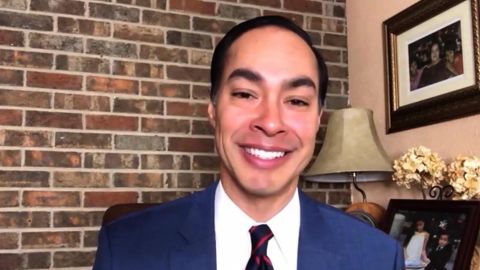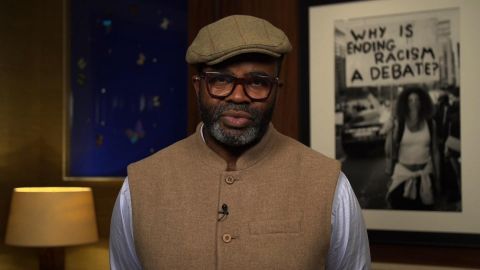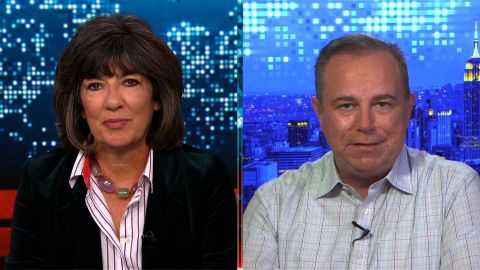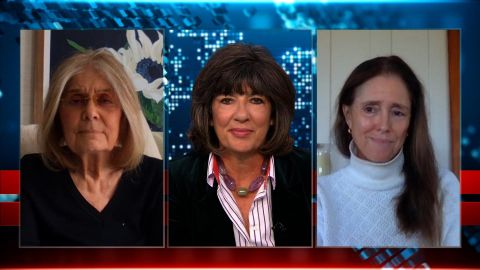Read Transcript EXPAND
CHRISTIANE AMANPOUR: Latinx will be the biggest nonwhite bloc for the first time in history with 32 million eligible voters. Julian Castro was the only Latino to run for president this election season before he pulled out early in the primaries. And he’s the former mayor of San Antonio, Texas. He was also secretary for Housing and Urban Development under President Obama. Even though he was a strong critic of Joe Biden’s record on immigration during the primaries, here, he tells our Walter Isaacson why, in fact, Biden is the right man for this moment and what he made of that debate.
(BEGIN VIDEOTAPE)
WALTER ISAACSON: Thank you, Christiane. And Secretary Julian Castro, welcome to the show.
FMR. MAYOR JULIAN CASTRO (D-SAN ANTONIO, TX): Great to be with you, Walter.
ISAACSON: You’ve got two young kids. I think they’re probably a little too young to be watching the debate. But do you worry about them saying American politics in action these days?
CASTRO: I mean, what I worry about is that a lot of young people already, as you know, don’t vote. They’re the hardest segment of our population to get out to vote. And if somebody is tuning into that, I mean, I think in that sense, Trump accomplishes what he wants because people throw their hands up after about three minutes, they turn the channel, don’t watch anymore of it. And so, instead of attracting people into our democracy to participate, you repel people and that helps Donald Trump fundamentally/ So, yes, for my own kids, you know, they watch some of it. They just get the wrong message. And I think that Joe Biden had it right. This guy is not serious. He was acting, unfortunately, like a clown. Nobody takes joy in saying that. Nobody wants the leader of their country, especially in the United States of America, you know, to act like that, but that’s true, that’s accurate.
ISAACSON: Trump refused to denounce white supremacist groups including the Proud Boys. Do you the core of his message is some racist, the white supremacist dog whistle?
CASTRO: Well, absolutely. I mean, Trump has been the biggest dog whistle politician, racial grievance politician that we’ve seen on the national stage since George Wallace. I mean, that is how he’s hoping to win. He won — I think he believes he won Michigan, Wisconsin, Pennsylvania by just juicing out enough support from people that might sympathize with him there and by depressing the turnout of African-Americans. And so, this is one more dog whistle to try and amp up what he sees as his base. And it’s unfortunate because, you know, as, you know, there have been presidents who in moments have gone counter to the knock on them or the narrative about them. He had a perfect moment just like he did when Senator McCain died, when he could have been gracious, he could have given Senator McCain his do as a war hero, as a patriot. He could have said, you know what, yes. You know, after everything that we’ve been through, after what happened to George Floyd, after all of the unrest up there, you know, stand back, stand down not standby, which is what he said, it was another moment where he tried to put himself and his own political interests above the interests of the country.
ISAACSON: Trump’s most (INAUDIBLE) consistent political message has been to rail against illegal immigration and indeed, at times, against all immigration. Do you think that that’s a racist message?
CASTRO: I think it plays on it for sure. I don’t think that this president is simply interested in stopping people who are undocumented from coming into the country just because, in fact, he has a track record as a business owner of using undocumented labor in his business. So, he has consistently been able — been willing to accept undocumented labor when it has profited him. He uses it in politics because, again, he knows that it caters to this base of people that he can juice support from to turn out and vote for him. And if you didn’t do that, you know, I know I think he might just as well keep his mouth shut and keep profiting off of undocumented labor. But he knows what he’s doing.
ISAACSON: During your campaign you strongly challenged Vice President Biden on immigration and you said that crossing the border with authorization should not be illegal or a crime. You know, by Biden disagreed and he said, if you cross the border illegally, it should be a crime. Are you comfortable with his position now?
CASTRO: Yes. Look, Joe Biden has a reasonable and commonsense approach on immigration. I don’t expect Vice President Biden to agree with me or, you know, other folks on every single point. What I do see in his policy is, number one, that he wants to stop the cruelty, he wants to replace that with an actual plan for sensible immigration policy. That means a pathway to citizenship for undocumented immigrants. It means ensuring that dreamers can stay in the United States and have peace of mind and can keep contributing to our nation’s progress. It means ending cruel policies like that migrant protection protocols or remain in Mexico policy. So, yes. I mean, what I see in Joe Biden is somebody that understands we need to go in a different direction. And I believe the American people understand that as well.
ISAACSON: You know, back in 2013 when you were San Antonio mayor you endorsed originally Obama’s enhanced immigration enforcement and then you and Joe Biden served in an administration that actually deported, you know, 3 million people and even separated families, although on a much smaller scale than has happened in this administration. Do you feel that — how do you feel about those policies now and did you and Biden do enough to prevent those deportation?
CASTRO: Well, I said very clearly on the debate stage that we needed to learn the lessons of the past. We need to make sure that going forward that, you know, we did not make the mistake of thinking, for instance, that you could deport your way to the negotiating table with Mitch McConnell and the Republicans, because that’s not going to happen. I think the vice president has said it right, which is that, you know, perhaps took too long to get it right. But toward the end of the Obama administration, for instance, it instituted something called the Family Case Management Program, which instead of separate families, instead, you know, incarcerating them, you let them stay together. And through actively engaging with them, ensure that people would show up for their court appointments, you know, that they kept in the court system that they’re supposed to be in, that that’s a humane way to do it and that’s also an effective way to do it. What you see with Donald Trump in contrast is somebody who has a dark heart when it comes to immigrants. Somebody that has used that as a political pinata to juice up a base and get elected. And I think if you connect this with his comments about the Proud Boys and his comments at the Charlottesville, I really believe that, at based, he is a racist.
ISAACSON: Wow. You just said he was a dark hearted and a racist. You’ve also called him cruel. I mean, are people going too far in political rhetoric?
CASTRO: Oh, I don’t think so. I mean, look at the news just a couple of weeks ago out of an ice facility in Georgia where a whistleblower has put forth allegations — and these are just the latest ones, that women were being subjected to hysterectomies and other procedures that they didn’t need, these were detained migrant women. Also, all of the children that were separated from their parents. I remember that audiotape of the young girl, for instance, from two years ago, crying out for her family. You know, time after time, Donald Trump could have put an end to that. Not only did he not stop it, he enhanced it. And to me that’s the mark of a cruel man.
ISAACSON: The top administration recently rescinded an Obama (INAUDIBLE) housing rules, something you were involved with. What’s your reaction to that?
CASTRO: It’s a shame that this president wants to take this backward. The Fair Housing Act was passed in 1968 by Lyndon Johnson right after the passing of Martin Luther King. And, in 2015, the Obama administration put forward a rule called affirmatively furthering fair housing that was unfinished piece of business from the Fair Housing Act that told cities, counties, housing authorities getting money from — taxpayer money from HUD, you have to get serious about making sure that there’s fair housing opportunity in your jurisdiction. The president has taken that. He has smeared it. He’s lied about it, mischaracterized it, and tried to drum up white fear in the suburbs by suggesting that people of color are going to suddenly move into your suburb. It’s a lie in different ways. First of all, suburbs are more integrated today than they were in 1968. So, people understand each other. They are living together more than they were back then. Secondly, he’s lying about the policy. The policy did not dictate to suburbs or any other communities exactly what they had to do to achieve better fair housing. And then, thirdly, I think that he’s selling the vast majority of white Americans short. I don’t think that the vast majority of white Americans are sitting at home trying to figure out how they can keep people of color and black Americans out of their neighborhood. I mean, he really is a throwback. And he’s trying to take all of us back to 50 years ago or longer.
ISAACSON: Trump seems to be doing well with Latino voters, especially Cuban Americans in Florida and some other places. What do you think that Biden should be doing? And why do you think that’s happened?
CASTRO: Well, I mean, look, it’s true that Vice President Biden is not yet where the campaign wants to be with Latinos. It’s a few points off. He’s a few points off from where Hillary Clinton was. I did see some encouraging news a couple of days ago. There was a Univision poll that had him at 66 for Biden, 25 for Trump, with the rest undecided. That’s within striking distance by the time we get to November 3 to have a good showing for Biden. But what the campaign needs to do — and I think they get this — is, they need a full-court press. And they need to do it in a nuanced way that recognizes the diversity within the Latino community, Cuban Americans, Puerto Ricans, Mexican Americans in these states like Arizona and Nevada and here in Texas that has become a swing state. And I think they’re — they have begun to push a lot. And so I expect that, as people get into early voting, and we go to Election Day, that he’s going to do well.
ISAACSON: Latinos are three times as likely to be infected by coronavirus as Caucasian Americans, and they’re twice as likely to die from the disease. What’s at the core of these inequities? And what do we do about it?
CASTRO: As many people have pointed out, the COVID-19 has laid bare so many of the inequities in our society. With regard to Latinos, it’s true that the Latino community has a higher death rate, higher hospitalization rate, higher infection rate. Part of that is because of what they do. They’re working in many of these essential jobs, whether it’s farmworkers in the fields, people in meatpacking plants, grocery store workers, fast food workers, health care workers. And so they’re exposed more to this, but it’s also lack of good health care access, right? I bet that, if you look at the analysis, for many lower- income individuals, including a lot of Latinos and African-Americans, probably taking them longer to get to a doctor once they start showing the symptoms of this. The quality of the care they’re probably receiving in medical institutions is less. And, also, people have pointed out you have intergenerational households in the Latino community. But, mostly, I think it’s driven by these inequities that we see out there.
ISAACSON: Your stepmother passed away this summer from COVID. Condolences on that. And I think your father also had COVID and has recovered. How do those experiences affect the way you view the handling of this crisis?
CASTRO: It just drives home how serious everybody should take the coronavirus. And, also, I just — just feel like it didn’t have to be like that. And, also to see the numbers, over 200,000 people that have died in our country. And when you compare the United States to countries around the world, we’re almost the worst in terms of how we have handled this. Just a couple of days ago, we passed the one million, one millionth person who passed away from COVID. And more than 200,000 of those are from the United States. We make up more than 20 percent now of the world’s dead from COVID-19. And we’re far less than that in terms of world’s population. When did that happen? When did we become a country that was lagging and that was inadequate? I mean, for a long time, our country was always the one that was best in science, that was known as the smart country, as the leading country, as the country that people would hunker down and work together to get something done. And I’m not putting all of the blame that at one person’s footsteps, but Donald Trump has been totally incompetent when it comes to this. And he’s made us more polarized, which is going to — which is hurting our country already and is going to take longer than just one election to actually put back together. And so, every day that he’s in office, whether it’s regard to COVID-19, or any — our economy, any other thing we’re talking about, it’s just making it harder and harder, and it’s like adding greater speed of wind to your headwind. It’s going to take longer to get over it.
ISAACSON: Does Vice President Biden have a challenge ahead of him in explaining why and how he would expand Obamacare?
CASTRO: Well, look, I mean, we saw a decade ago that any time you make fundamental changes to our health care system, that’s going to both be a big fight, and it takes a lot of explaining. All of us remember the 1994 attempt to get to universal health care. And one of the challenges there was that the — there wasn’t the kind of explanation that Americans needed, or at least fell short. And I have no doubt that you’re going to have your interests, corporate interests, as well as Republicans, who will do everything that they can to try and stop more people getting good health care. They have already done that in states like Texas, my home state, where they won’t even expand Medicaid, even though it would hardly cost the state anything. So, Joe Biden and the Congress, Democratic Congress, will have a real task on their hands to make sure that the groundwork is there, that the American people are fully informed of what this is going to mean. And if you have that solid base, that foundation, then you can get changes made, like we did with the Affordable Care Act.
ISAACSON: With many people questioning the science behind climate change, how difficult will be for a President Biden to make any progress on that?
CASTRO: I feel confident that Joe Biden’s going to be able to make good progress on climate change. We have seen, just in the last few months, these wildfires in California. We have seen, over the last few years, these storms increasing their intensity and their frequency. I actually believe the American people, based on what I have seen out there in my travels around the country over the last six years to more than 40 states, more than 100 different communities, that the time is right and things are ripe for combating climate change. And I think that’s especially true with the youngest Americans. I don’t think it’s even a question for the vast majority of young Americans. That’s also reason that young Americans need to go out and vote in November.
ISAACSON: Secretary Julian Castro, thank you so much for being with us this evening.
CASTRO: Thanks a lot.
About This Episode EXPAND
Christiane speaks with Gloria Steinem and Julie Taymor about “The Glorias.” Walter Isaacson speaks with Julián Castro about the election. President Trump’s friend Christopher Ruddy gives his take on the debate. Photographer Misan Harriman explains the significance of Black History Month in the UK and why he’s auctioning off his historic British Vogue cover image for charity.
LEARN MORE



